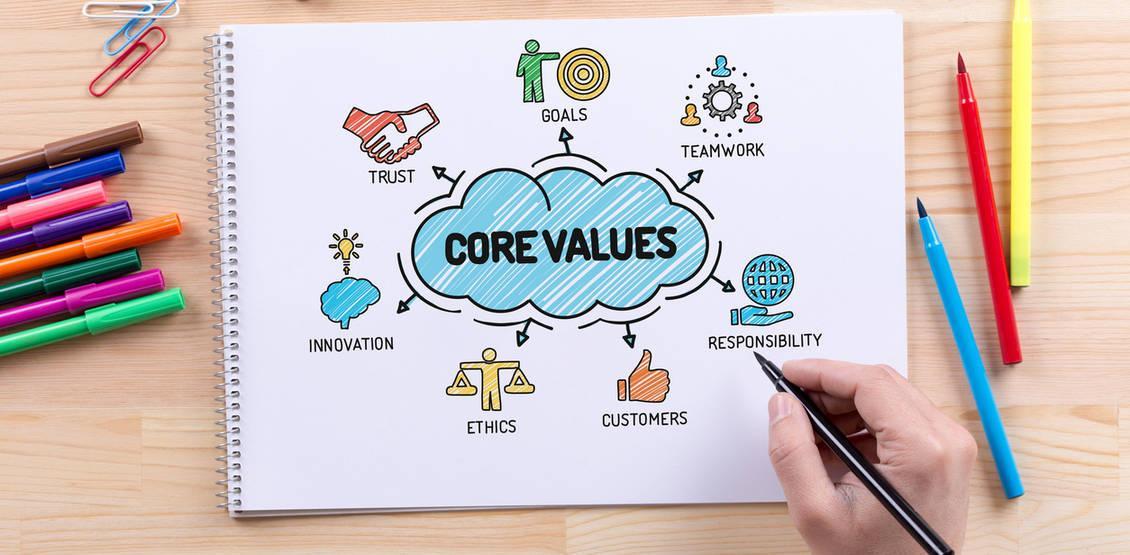When working with companies on developing customer-focused growth cultures, I often get asked about this idea of a company core values list. It seems that every company has a core values list, but oftentimes the words used are similar — and they can be words that mean many different things to different people. Does a company core values list even matter, then? Will it drive your growth in some way?
Absolutely it matters — and yes, it drives growth.
Why does a company core values list matter?
When I wrote I Love You More Than My Dog, this idea was often top of mind for me: if you look at the ‘beloved’ companies mentioned in the book, the one major aspect they all have in common is that they operate from a different, elevated place. They’re guided by their core values; their company core values list is a living, breathing document and not just a one-off that HR eventually owns. That, I think, is the key difference between a great company that’s able to focus entirely on customer experience — and a so-so company that struggles often to focus on its customers.
Think of the living, breathing document idea this way: you can list your company core values all you want, and maybe a few scattered people in your organization will believe them at face value all the time. But what really needs to happen beyond the creation of the document is the leaders of the organization living out the document.
Every employee needs to see leaders living out the company core values list, because that, in turn, gives the employees permission to ‘model’ that behavior. For better or worse, people are always going to model the behavior of leadership in a company — so you need to make sure your company is in the ‘better’ column and not the ‘worse’ one.
The first tier of a company core values list
Let’s say a company lists one of its core values as “operate with trust.” (This is just an example, not any specific company.) If that’s a listed core value, but then employees regularly see back-stabbing and in-fighting among the leadership, the core value has absolutely no meaning anymore. But if those same employees see collaboration and silo-crossing among the leadership, they’ll start to think “Operate with trust does seem important, and it’s the way we do things here.” Now the core value means something.
That’s the first tier of a company core values list — making sure the core values (a) mean something and (b) are lived every day by the leadership, and thus modeled by the rest of the organization. If you get to this stage, you’re doing a good job — and you will be well-positioned to build a customer-focused growth engine.
The advanced stage of a company core values list
The more ‘advanced’ stage of having a company core values list is having that set of core values guide everything you do, including:
- Recruiting
- Hiring
- Day-to-day behavior
- Promotion strategies
The Container Store is a good example there: they hire less than 3% of applicants, but have a turnover rate of less than 10%. Many executives would love those numbers: you’re getting the best of the best applicant-wise and not losing them (thus keeping organizational knowledge in-house and potentially away from competitors). How does The Container Store achieve something like that? There are different approaches and considerations they take to hiring, yes — they believe 3 ‘good’ employees equal 1 ‘great’ one, for example — but the central idea is that they live their core values. There’s alignment between purpose, ideology, action, and behavior from the leadership on down. Even if your salary isn’t astronomical, most people don’t leave a place like that.
If you’re in the startup or entrepreneur phase of developing a company, there are a million and five things to do — from incorporation to processes and systems to legal needs and staffing. It can be overwhelming, and oftentimes a company core values list is one of the last things you’ll consider in a crush of day-to-day tasks. It honestly might be the most important if you want to become a company beloved by your customers, though.
Reprinted from LinkedIn with permission from the author. View original post here.
Editor’s Note: Service Objects believes strongly in awarding our employees who stand out amongst their peers because of their consistent support of our corporate core values. Employees that meet and exceed expectations while they complete their daily tasks, going above and beyond with regard to the quality of their work are voted for the quarterly “Core Values Award” by their peers. The award is designed to celebrate the embodiment of each of Service Objects Four Core Values: Customer Service Above All, a Happy and Healthy Workplace, Corporate Conservation, and Network Excellence.
Author’s Bio: Jeanne Bliss, Founder & CEO, CustomerBliss
Jeanne Bliss pioneered the role of the Chief Customer Officer, holding the first-ever CCO role at Lands’ End, Microsoft, Coldwell Banker and Allstate Corporations. Reporting to each company’s CEO, she moved the customer to the strategic agenda, redirecting priorities to create transformational changes to each brands’ customer experience. Her latest book, “Chief Customer Officer 2.0” (Wiley) was published on June 15, 2015.












